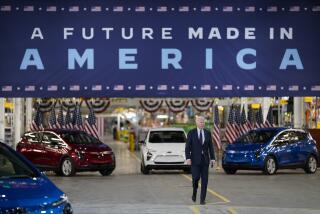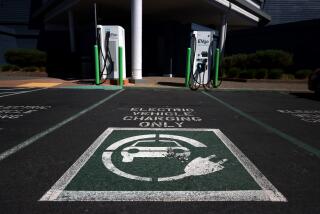‘Average’ Car Emission Plan Blocked by Panel : Action Means Each Vehicle--Not Maker’s Fleet Overall--Would Meet Clean-Air Standards
WASHINGTON — Environmentalists won a major victory Wednesday when a House subcommittee voted unanimously to remove from President Bush’s clean air bill a controversial provision allowing automobile manufacturers to “average” tailpipe emissions to meet federal anti-pollution requirements.
The House Energy and Commerce health and environment subcommittee agreed unanimously by voice vote to delete the averaging provisions from the President’s bill--the first major legislation designed to clean up the environment since the Clean Air Act was last amended in 1977.
The vote, which most committee members and lobbyists agreed effectively kills the averaging plan, means that automobile manufacturers will have to ensure that each car they make meets the new, stricter standards for tailpipe emissions by 1998. Under the Administration’s original proposal, some new cars could have exceeded the standards so long as the average emission of all the cars produced by each manufacturer did not exceed them.
Surprised Opponent
The collapse of the averaging proposal, which the Administration’s supporters had defended vigorously earlier in the week, came so suddenly that it appeared to surprise even its chief opponent, subcommittee Chairman Henry A. Waxman (D-Los Angeles).
Waxman Tuesday had lost a first-round attempt to strengthen the clean air bill’s anti-smog provisions in a narrow 12-10 vote, and seemed prepared for a spirited battle Wednesday. He opened hearings with a strong attack on the averaging proposal as a “travesty for consumers” that would actually “cause more pollution, take away consumer protections and create bureaucratic nightmares for effective enforcement.”
Most observers and committee members had expected that verbal salvo to serve as the cue for Rep. John D. Dingell (D-Mich.), Waxman’s nemesis on clear air issues, to champion the averaging proposals on behalf of the Detroit auto interests he represents. But the anticipated duel failed to materialize when Dingell, chairman of the full committee, surprised most of his colleagues by voting in favor of an amendment to delete the averaging provision.
Dingell, a chief sponsor of the Bush bill, fended off questions about his decision to support the Waxman proposal, saying that “I just wanted my colleagues to feel comfortable.” However, he refused to rule out the possibility of trying to revive the averaging proposal when the clean air bill goes to the full committee.
Dingell Supporters
“This subcommittee is heavily stacked with Dingell supporters,” noted Daniel Weiss, Washington director of the Sierra Club’s pollution and toxics program. “If he (Dingell) can’t get the votes he wants for averaging here, he’s not going to be able to get them anywhere else.”
Waxman said that he thought Dingell and his allies “saw the handwriting on the wall and went along rather than take a loss” on the averaging issue. He said that the next step in the hearings, which reconvene Tuesday, will be to tackle the question of emissions standards.
Waxman wants to tighten the standards in the Bush plan by requiring new cars to meet emission standards currently in effect in California by 1993, with a further reduction of 50% by the year 2000. Under the Bush bill, auto makers would have until 1998 to meet standards equal to or, in the case of carbon monoxide emissions, considerably more lenient than those already in effect in California.
While environmentalists hailed the vote, several expressed concern that Dingell’s about-face on the issue may be only tactical--a maneuver to regroup and to dig into position for the bigger battle next week, when the subcommittee debates the standards for tailpipe emissions.
More to Read
Get the L.A. Times Politics newsletter
Deeply reported insights into legislation, politics and policy from Sacramento, Washington and beyond. In your inbox three times per week.
You may occasionally receive promotional content from the Los Angeles Times.










